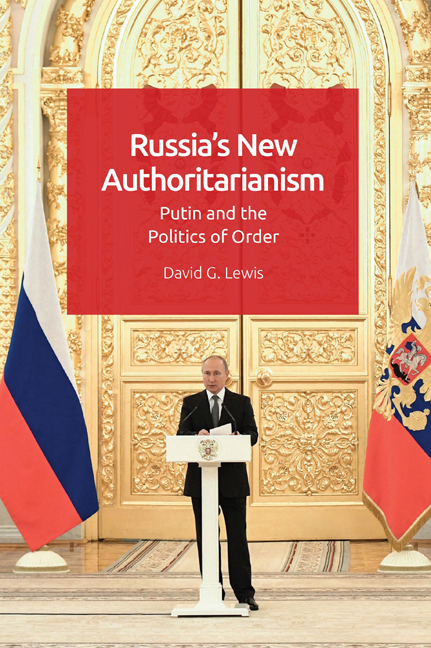Book contents
- Frontmatter
- Contents
- Preface
- Acknowledgements
- Note on Transliteration and Translation
- One Authoritarianism, Ideology and Order
- Two Carl Schmitt and Russian Conservatism
- Three Sovereignty and the Exception
- Four Democracy and the People
- Five Defining the Enemy
- Six Dualism, Exceptionality and the Rule of Law
- Seven The Crimean Exception
- Eight Großraum Thinking in Russian Foreign Policy
- Nine Apocalypse Delayed: Katechontic Thinking in Late Putinist Russia
- Conclusion
- Bibliography
- Index
Conclusion
- Frontmatter
- Contents
- Preface
- Acknowledgements
- Note on Transliteration and Translation
- One Authoritarianism, Ideology and Order
- Two Carl Schmitt and Russian Conservatism
- Three Sovereignty and the Exception
- Four Democracy and the People
- Five Defining the Enemy
- Six Dualism, Exceptionality and the Rule of Law
- Seven The Crimean Exception
- Eight Großraum Thinking in Russian Foreign Policy
- Nine Apocalypse Delayed: Katechontic Thinking in Late Putinist Russia
- Conclusion
- Bibliography
- Index
Summary
… Straining Order into Tyranny.
William GodwinIs Schmitt relevant to understanding the rise of an authoritarian regime in contemporary Russia, and its wider impact on global politics? Some scholars argue that using Schmitt, a proven anti-Semite and a defender of the Nazi regime, to illuminate the present is both misleading and inappropriate. Sitze, for example, writes of ‘the illusion that Schmittian thought is adequate for the task of naming our experience today’ (Sitze 2010: 66). For Sitze, our aim should be ‘to read Carl Schmitt so completely, so carefully, and so loyally, that we therefore close the book on him, turning now to face a set of crises about which Schmitt has, precisely, nothing to say’ (Sitze 2010: 66). Galli argues that at best Schmitt's work is partially effective ‘in its pars destruens’ to critique contemporary politics, but ‘in the pars construens – in the combination of decision and concreteness at the interior, and of war and spatiality at the exterior – it seems confused and inapplicable’ (Galli 2010: 21). Jens Meierhenrich and Oliver Simons compiled the excellent 800-page Oxford Handbook of Carl Schmitt, only to conclude that ‘it is important to read Schmitt, but not in order to understand the present’ (Meierhenrich and Simons 2016: 58).
Yet even as scholars attempt to close the book on Schmitt, his influence on contemporary political thought is inescapable. The rise of far-right and authoritarian politics around the globe owes much to Schmittian paradigms of thought. A global reaction against neo-liberal technocracy and economic and cultural globalisation has often taken political forms that reflect Schmitt's anti-liberalism: a politics that seeks to fix identities, polarise societies and build walls around communities; a view of democracy as defined by majoritarian identification with a leader, not by parliamentary process and the rule of law; and an international system dominated by the geopolitics of great powers, not global institutions and international law. Schmitt provides a coherent theory of anti-liberal politics that helps us to understand better these growing challenges to liberal thinking in the twenty-first century.
In this book I have attempted to show the relevance of Schmitt for understanding contemporary authoritarianism in Russia.
- Type
- Chapter
- Information
- Russia's New AuthoritarianismPutin and the Politics of Order, pp. 215 - 222Publisher: Edinburgh University PressPrint publication year: 2020



